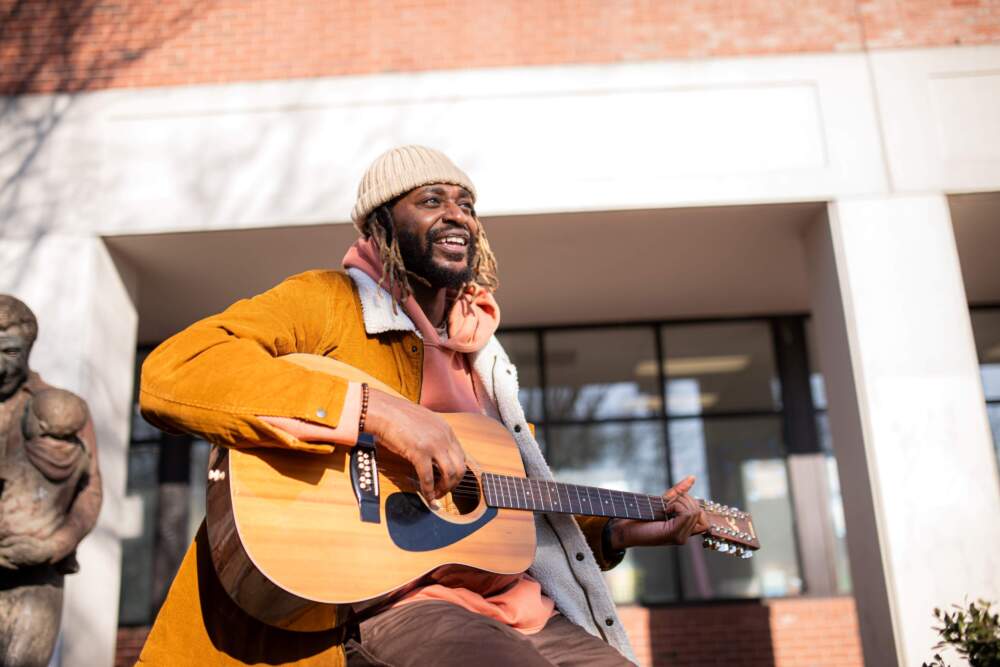Advertisement
A music festival at Club Passim reclaims folk music's Black roots
Resume
It’s not unusual to see Boston rapper Cliff Notez “shake s--- up,” as they put it. There was the time they put Boston Calling on notice for ignoring hip-hop and local artists, and threw an event — Boston Answering — in response. In some ways, the musician’s latest endeavor is classic Cliff Notez, in that it features a stacked lineup of (mostly) local Black musicians. But there’s one big difference: it’s a folk festival.
“I've been in love with folk music, soft rock, all kinds of music since I was a child,” Cliff Notez said. As a kid growing up in Boston, the dial was usually tuned to the gentle strains of Magic 106.7.
“My mom was very Christian, so listening to rap music was not allowed in her car. We're going to listen to soft rock and the calm, soothing sounds of David Allen Boucher,” they added, referring to the butter-voiced “Bedtime Magic” host who lulled Bostonians to sleep every night from 1982 to 2022.
There was one song that played all the time on the radio back then that Cliff Notez loved: “Fast Car,” Tracy Chapman’s famous ode to being broke and in love. Like a lot of us, they probably listened to “Fast Car” hundreds of times in the 1990s. And in their mind’s eye, Chapman was white.
Cliff Notez remembers being stunned when they first googled the cover art for "Fast Car," a closeup of Chapman’s face in dramatic shadow
“The first thing I noticed is Black skin, nose, lips, just like mine,” they said. “And then this hair that is also just like mine. And I'm like, ‘Oh s---, that could be me. That could be me.’”
Why was it such a surprise to see a Black woman with a guitar singing about being working class in America? After all, what we call "folk music" has clear connections to African American traditions, from the banjo to the blues. But when you hear "folk music," the first person who comes to mind — be it Bob Dylan, Pete Seeger or Joni Mitchell — is probably white.
In recent years, Black folk musicians like Rhiannon Giddens and Dom Flemons have drawn attention to the ways Black artists have been erased from the story of American folk music. Cliff Notez saw that, and was inspired.
“I was like, 'Okay, so they're thinking about it too,'” the musician said. “And if they're thinking about it as people who probably grew up in the genre, and I'm thinking about it as someone who is just starting to feel more comfortable in the genre, then let's get it all together and see what we can do with it."
That’s how the idea for We Black Folk Festival was born. The event is two nights of concerts at Club Passim in Harvard Square on consecutive Sundays, Feb. 4 and Feb. 11. Tickets sold out days in advance of the first show, despite competing with the Grammys and the Super Bowl. The festival can still be streamed online.
There are seven artists scheduled to play each night, many local to the Boston area. They represent an expansive approach to folk music, ranging from singer-songwriters like Grace Givertz to soul artists like Chris Walton to indie experimentalists like Anjimile.
Aisha Burns, a singer-songwriter and violinist based in western Massachusetts, is on the bill Feb. 4. She grew up playing fiddle in Texas and was often the only Black kid in the scene.
“Growing up, when you just have an interest and you're not really aware of this broader conversation, for me it made me feel so strange,” Burns said. “Like I was the odd bird in all of these spaces.”
Burns guessed that the festival would be the first time she shared a stage with exclusively Black artists.
“To this day, I can still count on one hand the number of bills that I have played where I'm sharing a bill with another Black person singing and playing guitar,” she said.
But, she added, it was probably past time Club Passim made changes to its predominantly white lineups.
“I think that realization is so long overdue,” Burns said. “It's 2024.”
In fact, We Black Folk Fest is the result of a diversity initiative at Club Passim called The Folk Collective. It’s the brainchild of Shea Rose, who was hired as a diversity, equity and inclusion consultant by Passim two years ago. The 12 artists in the collective’s first cohort meet regularly to discuss how the club can increase the diversity of its performers and audiences. They are also given the opportunity to present work on Passim’s stage, which is how Cliff Notez ended up pitching the festival.
“I loved the idea of working with artists to help guide us and answer some of the tough questions,” Rose said. “And the fact that music can be this beautiful catalyst for holding tough conversations.”
Rose hoped that the club would host We Black Folk Fest again next year.
“I hope that it can be a reflection of what Passim says in its mission, which is a place that welcomes all,” she said.
But Cliff Notez has ambitions beyond the venerable Cambridge venue. Maybe a stage at Rhode Island's Newport Folk Festival or the international Afropunk Festival. The ultimate dream would be a big annual festival in Franklin Park or another location that's closely linked to Boston's Black community.
“I'm looking at it from my experience: What stopped me from thinking I [could] pick up a guitar at 5 years old, as opposed to at 30 years old? And how many other people might be thinking that same way?” the musician said. “Part of it is having things that we own, having things that belong to us and feel like it's ours.”
This segment aired on February 2, 2024.
